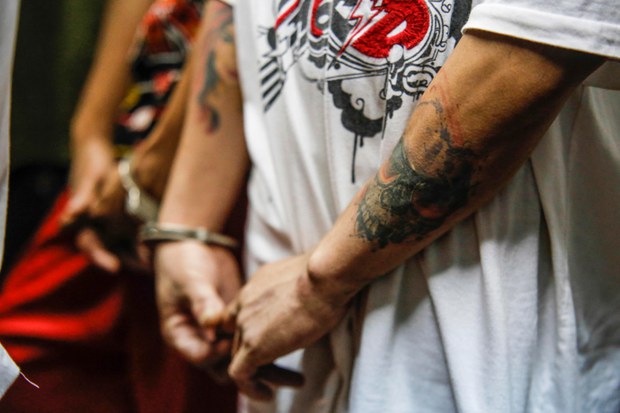Philippine Leader Challenges International Criminal Court Probe
2018.03.07
Davao and Baguio, Philippines
 Two of 17 suspected drug dealers are handcuffed after their arrests during a day-long anti-drug operation in September 2016 in the northern city of Dagupan.
Two of 17 suspected drug dealers are handcuffed after their arrests during a day-long anti-drug operation in September 2016 in the northern city of Dagupan.
Philippine President Rodrigo Duterte said Wednesday that the International Criminal Court could not bring charges against him even as it moves forward with a preliminary investigation into thousands of killings tied to his drug war.
Speaking to local officials in the northern city of Tarlac, Duterte dismissed the ICC threat as hollow and said it was only meant to distract him from governance.
“You don’t have jurisdiction over me,” Duterte said, referring to The Hague-based ICC.
Duterte’s police force counts more than 4,000 deaths in the drug war, lower than the estimated figure of 12,000 deaths that rights groups have claimed. The official figure excludes deaths blamed on pro-government vigilantes.
On Tuesday, Duterte said he was not responding to a statement by the “black lady” because he did not believe in the probe.
While he did not name anyone, Duterte apparently was referring to ICC prosecutor Fatou Bensouda. The attorney last month announced the preliminary investigation into accusations that Duterte and other officials may have committed crimes against humanity in the course of his deadly drug crackdown.
“You cannot acquire jurisdiction over me, not in a million years,” Duterte said.
Last month, Duterte’s spokesman said the president welcomed the investigation as a chance to prove his government had nothing to hide.
Duterte: dealers were forewarned
The president on Tuesday reiterated that drug dealers and addicts were forewarned before he was elected.
“When I became the president, I said don’t destroy my country. Do not make this into a Colombia or Mexico,” Duterte said. “Do not do that or I will kill you.”
He said he had a duty and a “solemn promise” to the Filipino people, about 16 million of whom voted him into office, to eradicate the drug problem.
“So the war against drugs will continue with or without the ICC, with or without the human rights, with or without the politicians,” Duterte said. “It will last until the last day of my term as president.”
Facing mounting international and local criticism after the deaths last year of three teenagers, Duterte removed the police from the lead role in the drug war. The official police versions said that the teenagers were drug couriers who were killed because they fought it out with arresting officers.
But in one of the cases, a closed-circuit television camera showed the police carting away the suspect before he was killed. The incident triggered widespread protests, including from the politically influential Catholic Church, and galvanized opposition to Duterte’s drug war.
The ICC’s investigation is based on a 77-page complaint filed by a former police officer and a self-proclaimed assassin who claimed he was employed by Duterte’s “death squad” during his reign as mayor of Davao city before being elected president.
That complaint, filed in April 2017, includes “crimes against humanity through mass murder” allegedly committed by Duterte and his death squad. Duterte has denied the allegations and the existence of the group.
Duterte spokesman Harry Roque has sought to play down the inquiry, saying the ICC prosecutor was exercising her mandate to check if there was reasonable basis to proceed forward, but called the action a “waste of the court’s time and resources.”







